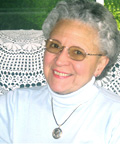Rhina P. Espaillat,
who was born in the Dominican Republic, has published seven books and three chapbooks, most recently Playing at Stillness, poems in English; Agua de dos rios/Water from Two Rivers, a bilingual collection of poems and essays; and El olor de la memoria/The Scent of Memory, a collection of short stories, also bilingual.
Her honors include the Eliot Prize, the Wilbur Award, the Nemerov Award, and several prizes from the Poetry Society of America and the New England Poetry Club. A founding member of the Powow River Poets, Espaillat lives in Newburyport, Massachusetts with her sculptor husband, Alfred Moskowitz.
—Back to Milestones Contents—
|
Learning Bones
I’m learning bones to please my father’s ghost.
Cranium, Maxilla—he knew them all
and loved to reel them off, each Latin name
sonorous and ornate, as from a tongue
speaking the nineteenth century. He’d boast—
his only vanity—total recall:
Mandibula, Clavicula—and not
one out of place, named wrongly, or forgot,
although learned long ago, when he was young.
Useless for me to argue that “breastbone”
is really just as good and quite the same
as Sternum; on that point, he became stone.
Gospelled by my own time, I worshipped use:
What use was it, I gibed, to learn by heart,
in a dead language, static part by part?
Better to know the function of the glands,
for instance (which I knew he did not know),
the mind’s evasions, or the work of dreams.
He didn’t like my century: obtuse,
almost, to change, he couldn’t trust what seems;
he wanted things to be, and to be there
forever in their place, like arms and hands.
Humerus, Radius, Ulna do not flow
beyond mind’s grasp like impulse or nightmare.
He liked the rational, the decent look
of bones in place, holding the flesh upright
as bones do—as they seem to, in his book.
When Latin failed him, and the torment came
that numbered and wrenched his bones as on a rack,
he learned the flow of nightmare into night.
The journey he took up has no returning,
and no soft speech will bring soft answer back,
but (clumsy, slow Aeneas!) I am learning
Ilium, Ischium, Femur—a long prayer
always descending earthward, rung by rung—
Fibula, Metatarsus—to the ground
in whose disorder lies that careful man.
Pious at last, I pray his sleep is sound.
We make amends in any way we can.
[Originally published in Plains Poetry Journal and in Lapsing to Grace
(Bennett Kitchell, 1992)]

Artist’s Statement
This poem stands out in my life as a milestone because it marked, in my opinion, a new maturity in my writing, a hard-won acceptance of the way things are, whether we like them that way or not. My beloved father, an important influence on every aspect of my life, had died many years before, and I had not succeeded in shaking off the grief natural to such a loss, and the added sorrow of knowing that the cultural differences between us—the result of my upbringing and education in the United States, and his tenacious clinging to his Dominican habits of thought—had persisted to the end of his life, despite lifelong mutual love and pleasure in each other's company.
The poem uses a trivial difference—his preference for the Latin names for scientific data—to suggest the “generation gap” that was also cultural, and to show how, even after the final separation, love seeks for ways to bridge distances and speak itself clearly. The reference to bones, in particular, recalls both the pain of his death by cancer, and his interest in science. The reference to Latin is a double pun of sorts: first because my father loved the classics, including Virgil’s Aeneid, in which the hero Aeneas flees the ruins of Ilium—the other name for Troy—bearing his old father on his back. “Pious Aeneas” succeeded in saving his father; I could not save mine. Second, many in my family were praying for him, in the Latin of the Church, but they also failed to save him.
The writing of this poem in 1984 marked the final step in my acceptance of this first painful loss in my life, and allowed me to let him go and remember him finally without sorrow. It also marks an acceptance of the inevitability of change that will always separate us, to some degree, from those before us and those after. By the time I wrote it, I had children of my own old enough to teach me that the cycle repeats itself, as does the devotion. Part of my satisfaction with the poem, and my special feeling for it, resides in the fact that I think in its lines I employ factual data to convey complex feeling better than I had ever succeeded in doing before, and the conviction that my father
would have liked it.
|


